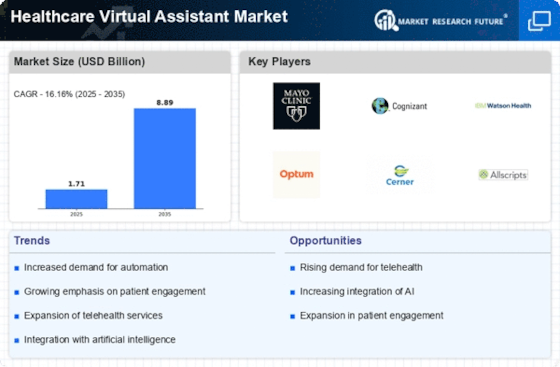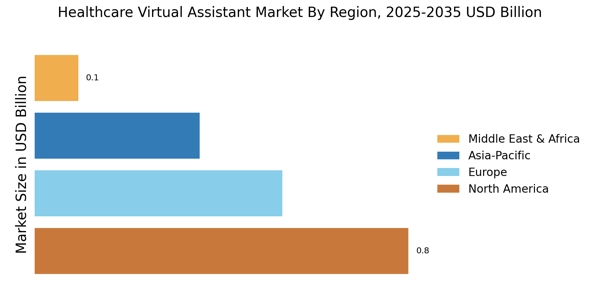Integration with Electronic Health Records
The integration of virtual assistants with electronic health records (EHR) systems is a key driver in the Healthcare Virtual Assistant Market. This integration allows virtual assistants to access patient data seamlessly, enabling them to provide more accurate and contextually relevant information to both patients and healthcare providers. As EHR systems become more prevalent, the demand for virtual assistants that can interface with these systems is likely to increase. Market analysis suggests that the EHR market is projected to grow significantly, which will, in turn, bolster the Healthcare Virtual Assistant Market. This synergy between virtual assistants and EHR systems is expected to enhance operational efficiency and improve patient care outcomes.
Rising Demand for Cost-Effective Solutions
The Healthcare Virtual Assistant Market is experiencing a notable surge in demand for cost-effective solutions. Healthcare providers are increasingly seeking ways to reduce operational costs while maintaining high-quality patient care. Virtual assistants offer a viable alternative by automating routine tasks, thereby freeing up healthcare professionals to focus on more complex patient needs. According to recent data, healthcare organizations that implement virtual assistants can reduce administrative costs by up to 30%. This trend is likely to continue as more institutions recognize the financial benefits of integrating virtual assistants into their operations. As a result, the Healthcare Virtual Assistant Market is poised for substantial growth, driven by the need for efficiency and cost savings.
Advancements in Natural Language Processing
Advancements in natural language processing (NLP) are significantly influencing the Healthcare Virtual Assistant Market. These technological improvements enable virtual assistants to understand and respond to patient inquiries more effectively, enhancing user experience. The ability to process and analyze vast amounts of data allows virtual assistants to provide personalized responses, which is crucial in healthcare settings. As NLP technology continues to evolve, it is expected that the accuracy and efficiency of virtual assistants will improve, leading to increased adoption by healthcare providers. This trend suggests that the Healthcare Virtual Assistant Market will expand as organizations seek to leverage these advancements to improve patient interactions and streamline communication.
Growing Emphasis on Remote Patient Monitoring
The growing emphasis on remote patient monitoring is reshaping the Healthcare Virtual Assistant Market. With the increasing prevalence of chronic diseases, healthcare providers are focusing on innovative solutions to monitor patients outside traditional clinical settings. Virtual assistants play a pivotal role in facilitating remote monitoring by providing patients with timely reminders, health tips, and real-time feedback on their conditions. This integration not only enhances patient engagement but also improves health outcomes. Market data indicates that the remote patient monitoring segment is expected to grow at a compound annual growth rate of over 25% in the coming years, further driving the demand for virtual assistants in healthcare.
Increased Focus on Data Security and Compliance
In the Healthcare Virtual Assistant Market, there is an increased focus on data security and compliance with regulations such as HIPAA. As virtual assistants handle sensitive patient information, healthcare organizations are prioritizing the implementation of robust security measures to protect data integrity and confidentiality. This heightened awareness of data security is likely to drive the development of more secure virtual assistant technologies. Organizations that invest in compliant virtual assistant solutions may gain a competitive edge, as patients are becoming more discerning about their data privacy. Consequently, the Healthcare Virtual Assistant Market is expected to evolve, with a stronger emphasis on security features and compliance capabilities.

















